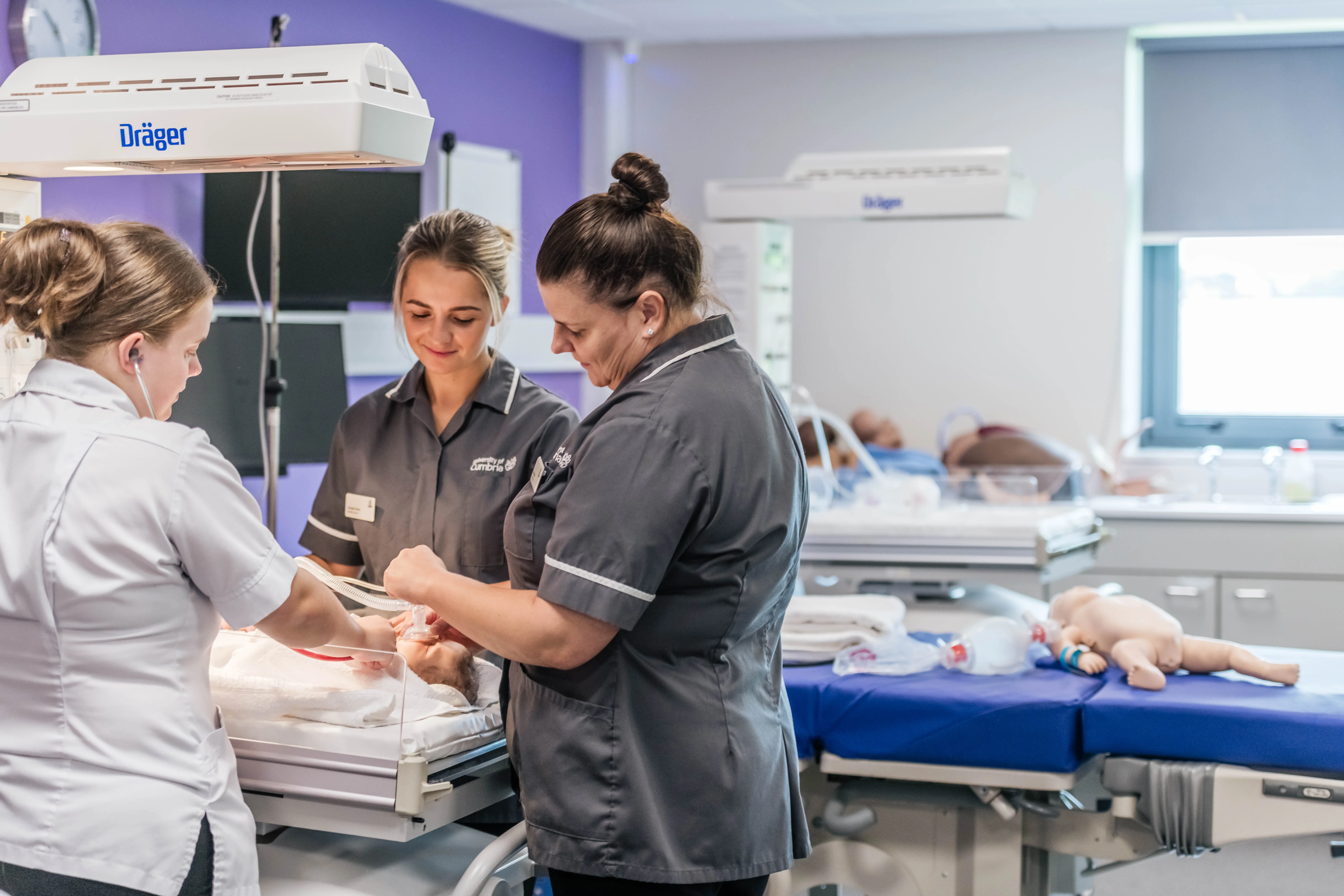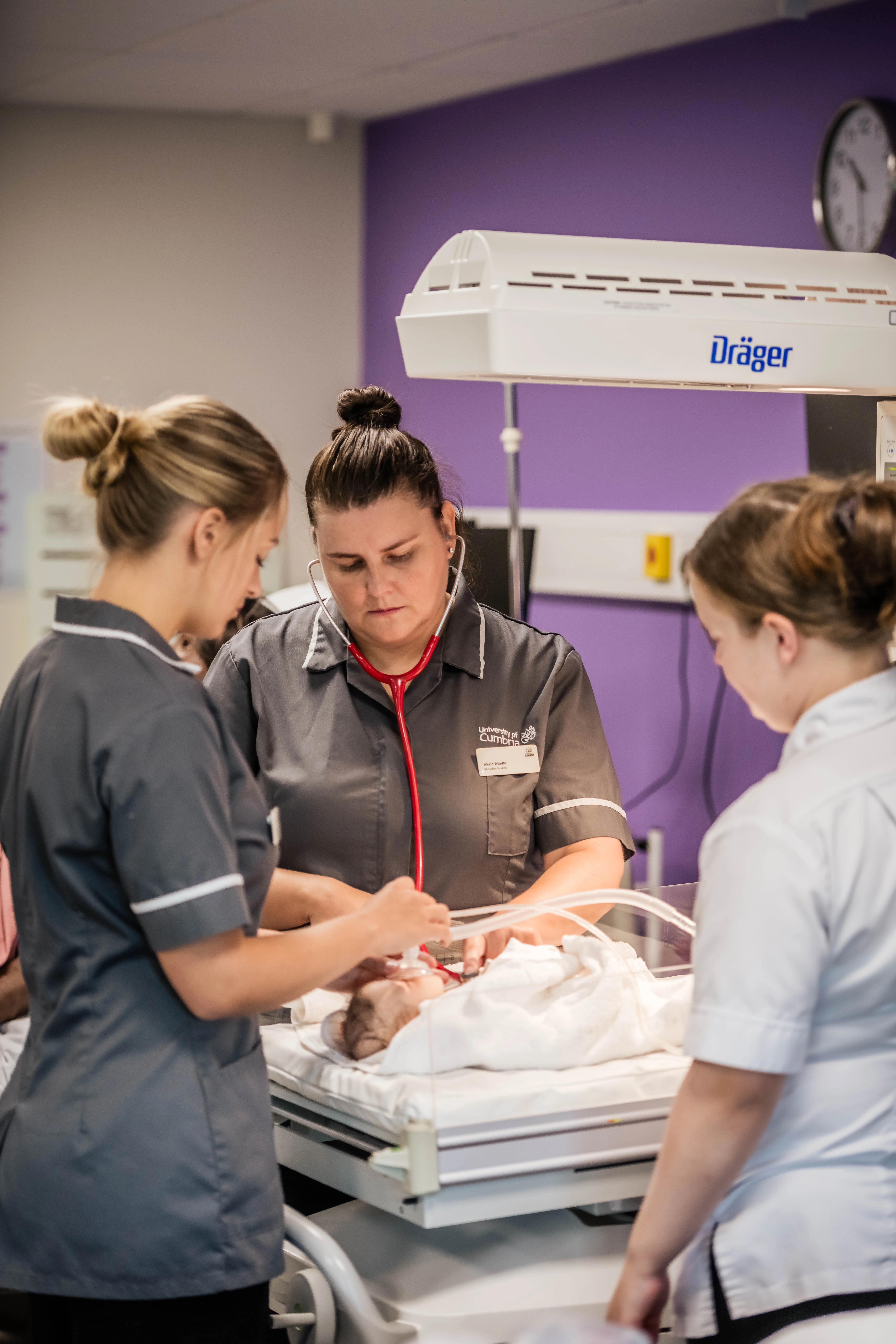BSc (Hons) - Midwifery
Considering becoming a midwife? Our midwifery degree provides specialist vocational training and learner support for you to become a fully qualified midwife.
You will become skilled in midwifery, learning how to provide compassionate care to birthing parents, newborns and their families during this significant period in their lives.
What’s more, our midwifery courses are ranked 1st in the North West for students satisfied with assessment and 2nd in the North West for students satisfied with teaching (Guardian University Guide 2023 Results). With Nursing and Midwifery Council accreditation, you’ll be ready for employment straight after graduation.
We are unable to accept International Applications for this programme.
Course Overview
On this midwifery course, you’ll spend 50% of your time in practice, equating to 2,300 hours of practice learning over three years. You will work with highly skilled professionals to train as a midwife, supporting birthing parents and their families to access healthcare while boosting your skills and confidence.
Throughout this degree, you will experience midwifery care in all settings, working with continuity of care teams, on consultant-led units, birth centres, and within the community. Alongside this, you will experience bespoke placements in neonatal units, theatres, and medical and surgical wards.
NHS placements are available with North Cumbria Integrated Care (Carlisle, Whitehaven and Penrith), University Hospitals of Morecambe Bay (Lancaster, Barrow and Kendal), Blackpool Teaching Hospitals, and Lancashire Teaching Hospitals (Preston and Chorley), as well as in the surrounding community areas. Places are limited for Blackpool and Lancashire Teaching Hospitals, and priority will be given to students who live close to these areas.
In addition, elective placement weeks are built into each year of the midwifery degree where you can take the opportunity to experience midwifery practice elsewhere in the country. The placements aim to ensure you experience all care settings. You will also have the opportunity to take an elective placement abroad.
Theory is delivered by expert teaching staff and is based on the latest evidence and research, using modern teaching methods and technology.
On this course you will...
- Study and train to be a midwife, boosting your academic and clinical skills with practical sessions in our state-of-the-art clinical simulation facilities.
- Be closely supported by passionate lecturers who bring invaluable experience to teaching and provide excellent pastoral support alongside your midwife training.
- Benefit from exciting, diverse placements providing you with experience of a variety of healthcare systems across inner-city and rural areas, widening your midwifery experience and learning.
- Apply midwifery theory to real-life midwifery care in practice, so that you are confident and competent in supporting birthing parents and their families through pregnancy, birth and postnatal period.
- Become eligible to register as a midwife with the Nursing and Midwifery Council (NMC). You'll be recognised as a safe and competent midwife ready for employment.
What our students say
-
![Chloe Searle]()
Since being qualified, I am honoured to have been awarded ‘Newly Qualified Midwife of the Year’ from the Mama Academy, being nominated by another colleague. This was an honour but is something I am very proud of. Without the support of the Midwifery lecturing team at UoC this wouldn’t have been achievable.
Chloe Searle
After graduating in 2022, Chloe gained a job at Liverpool Women's Hospital and was awarded Newly Qualified Midwife of the Year (2023). Chloe loved the variety of placements and strong student support at Cumbria, and has graduated with friends and memories to last a lifetime.
-
![Chantel Cumpsty]()
My life is completely changed through retraining. I am studying for a career that I love and that feels right for me. I am very proud of what the university has enabled me to achieve. For me, the University of Cumbria is the place to study if you want to study at an up-and-coming, supportive university.
Chantel Cumpsty
On retraining as a midwife after completing a women's studies degree.
-
![Abbie Stainton, Midwifery]()
Advocating for and supporting women through one of the most important milestones in their lives is such an honour. I love being part of the pregnancy journey, alongside women and their families, being able to make a positive impact as a student midwife.
Abbie Stainton, Midwifery
Winner of the North Cumbria Integrated Care Thank You 2020 Student Award, midwifery student Abbie found her experience on placement during the Covid-19 pandemic invaluable.
Experience Midwifery at Cumbria


.webp)

Location
Carlisle - Fusehill Street Campus
The Fusehill Street campus has been the setting of life-saving treatments since World War I. Now, it's home to world changers, life-savers, crime fighters, and entrepreneurs with access to high-quality facilities and innovative thinking.
Find out moreLocation
Lancaster Campus
Lancaster is the Red Rose heartland, a student haven full of history and culture. With iconic stone architecture, parkland, and a caring community, this is the place to get involved. The campus houses top-quality facilities tailored to the needs of life-savers, world changers, and future leaders.
Find out more
Find out more about studying with us
Attend an Open Day at Cumbria
An Open Day is your opportunity to explore one of 5 campuses, meet your lecturers, and find out how the University of Cumbria could become your new home.


-200x111.png)
.webp)






-200x200.jpg)

.webp)


